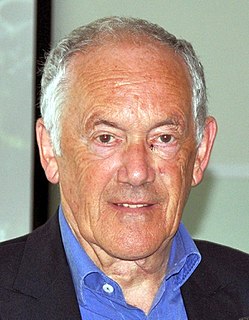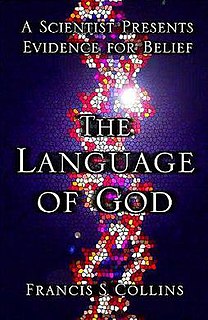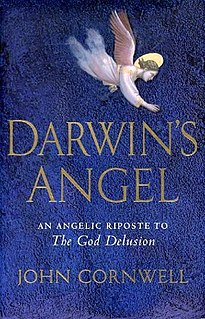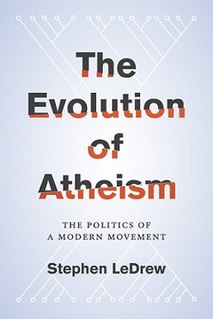Related Research Articles

Richard Dawkins is a British evolutionary biologist and author. He is an emeritus fellow of New College, Oxford and was Professor for Public Understanding of Science in the University of Oxford from 1995 to 2008. An atheist, he is well known for his criticism of creationism and intelligent design.

Peter William Atkins is an English chemist and a Fellow of Lincoln College at the University of Oxford. He retired in 2007. He is a prolific writer of popular chemistry textbooks, including Physical Chemistry, Inorganic Chemistry, and Molecular Quantum Mechanics. Atkins is also the author of a number of popular science books, including Atkins' Molecules, Galileo's Finger: The Ten Great Ideas of Science and On Being.
Michael Ruse is a British-born Canadian philosopher of science who specializes in the philosophy of biology and works on the relationship between science and religion, the creation–evolution controversy, and the demarcation problem within science. Ruse currently teaches at Florida State University.

Alister Edgar McGrath is a Northern Irish theologian, Anglican priest, intellectual historian, scientist, Christian apologist, and public intellectual. He currently holds the Andreas Idreos Professorship in Science and Religion in the Faculty of Theology and Religion, and is a fellow of Harris Manchester College at the University of Oxford, and is Professor of Divinity at Gresham College. He was previously Professor of Theology, Ministry, and Education at King's College London and Head of the Centre for Theology, Religion and Culture, Professor of Historical Theology at the University of Oxford, and was principal of Wycliffe Hall, Oxford, until 2005.

John F. Haught is an American theologian. He is a Distinguished Research Professor at Georgetown University. He specializes in Roman Catholic systematic theology, with a particular interest in issues pertaining to physical cosmology, evolutionary biology, geology, and Christianity.
The Atheism Tapes is a 2004 BBC television documentary series presented by Jonathan Miller. The material that makes up the series was originally filmed in 2003 for another, more general series, Atheism: A Rough History of Disbelief, but was too lengthy for inclusion. Instead, the BBC agreed to create The Atheism Tapes as a supplementary series of six programmes, each consisting of an extended interview with one contributor.

Russell's teapot is an analogy, formulated by the philosopher Bertrand Russell (1872–1970), to illustrate that the philosophic burden of proof lies upon a person making empirically unfalsifiable claims, rather than shifting the burden of disproof to others.
Criticism of atheism is criticism of the concepts, validity, or impact of atheism, including associated political and social implications. Criticisms include positions based on the history of science, philosophical and logical criticisms, findings in both the natural and social sciences, theistic apologetic arguments, arguments pertaining to ethics and morality, the effects of atheism on the individual, or the assumptions that underpin atheism.

The God Delusion is a 2006 book by British evolutionary biologist, ethologist Richard Dawkins, a professorial fellow at New College, Oxford and, at the time of publication, the Charles Simonyi Chair for the Public Understanding of Science at the University of Oxford.

Letter to a Christian Nation is a 2006 book by Sam Harris, written in response to feedback he received following the publication of his first book The End of Faith. The book is written in the form of an open letter to a Christian in the United States. Harris states that his aim is "to demolish the intellectual and moral pretensions of Christianity in its most committed forms." In October it entered the New York Times Best Seller list at number seven.

Dawkins' God: Genes, Memes, and the Meaning of Life is a book by Alister McGrath, a theologian who is currently Professor of Historical Theology at Oxford University. The book, published in 2004, with a second edition in 2015, aims to refute claims about religion made by another well-known professor at Oxford, Richard Dawkins. McGrath's book does not seek to demonstrate how Dawkins’ claims differ from Christianity, rather, it argues that Dawkins' arguments fall far short of the logical and evidence-based reasoning that Dawkins himself espouses.
Pharyngula, a blog founded and written by PZ Myers, is hosted on ScienceBlogs and on FreeThoughtBlogs (2011–present). In 2006 the science journal Nature listed it as the top-ranked blog written by a scientist based on popularity. The blog addresses a range of topics, including Myers's academic specialty, biology. It has become particularly well known for Myers's writing style and for his criticism of intelligent design and creationism. In 2009, Hemant Mehta ranked Pharyngula the most popular atheist blog, based on subscriber levels and other factors.
The Ultimate Boeing 747 gambit is a counter-argument to modern versions of the argument from design for the existence of God. It was introduced by Richard Dawkins in chapter 4 of his 2006 book The God Delusion, "Why there almost certainly is no God".

The Dawkins Delusion? Atheist Fundamentalism and the Denial of the Divine is a book by the theologian Alister McGrath and the psychologist Joanna Collicutt McGrath. It is written from a Christian perspective as a response to arguments put forth in The God Delusion by Richard Dawkins. The work was published in the United Kingdom in February 2007 by the Society for Promoting Christian Knowledge and in the United States in July 2007.

The Language of God: A Scientist Presents Evidence for Belief is a bestselling book by Francis Collins in which he advocates theistic evolution. Collins is an American physician-geneticist, noted for his discoveries of disease genes, and his leadership of the Human Genome Project (HGP). He currently serves as the director of the US National Institutes of Health. In the book, Collins describes briefly the process by which he became a Christian.

Darwin's Angel is a book published in response to Richard Dawkins' The God Delusion. It was written by John Cornwell and subtitled An Angelic Riposte to The God Delusion.

Expelled: No Intelligence Allowed is a 2008 American documentary-style propaganda film directed by Nathan Frankowski and starring Ben Stein. The film contends that there is a conspiracy in academia to oppress and exclude people who believe in intelligent design. It portrays the scientific theory of evolution as a contributor to communism, fascism, atheism, eugenics and, in particular, Nazi atrocities in the Holocaust. Although intelligent design is a pseudoscientific religious idea, the film presents it as science-based, without giving a detailed definition of the concept or attempting to explain it on a scientific level. Other than briefly addressing issues of irreducible complexity, Expelled examines intelligent design purely as a political issue.
The term New Atheism was coined by the journalist Gary Wolf in 2006 to describe the positions promoted by some atheists of the twenty-first century. New Atheism advocates the view that superstition, religion and irrationalism should not simply be tolerated. Instead, they should be countered, criticized, and challenged by rational argument, especially when they exert undue influence, such as in government, education, and politics. Major figures include Richard Dawkins, Sam Harris, Christopher Hitchens and Daniel Dennett—collectively known as the "Four Horsemen", and Ayaan Hirsi Ali, known as the "plus one horse-woman".
Sex, Death and the Meaning of Life is a three-part television documentary presented by Richard Dawkins which explores what reason and science might offer in major events of human lives. He argues that ideas about the soul and the afterlife, of sin and God's purpose have shaped human thinking for thousands of years. He believes science can provide answers to some of these old questions we used to entrust to religion.

The Evolution of Atheism: The Politics of a Modern Movement is a 2015 book by Stephen LeDrew, adapted from his PhD dissertation. Though an atheist, LeDrew criticises the movement of New Atheism, which arose in the 2000s with the "Four Horsemen" Richard Dawkins, Daniel Dennett, Sam Harris and Christopher Hitchens as prominent figures.
References
- 1 2 3 Johns, Ian (2006). Atheism gets a kick in the fundamentals. The Times . Retrieved 3 November 2017.
- ↑ Liddle, Rod (6 December 2006). A man who believes in Darwin as fervently as he hates God. The Spectator . Retrieved 3 November 2017.
- ↑ Chater, David (2006). Viewing guide: The Trouble with Atheism. The Times . Archived 17 May 2011 at the Wayback Machine
- ↑ The Sunday Times , 17 December.
- ↑ Sam Wollaston, "Last night's TV," The Guardian , 16 December 2006. Retrieved 3 November 2017.
- ↑ The Times, 19 December 2006.